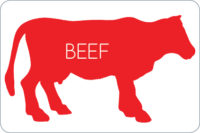Holding Steady?
By Megan Pellegrini, contributing writer
The meat industry is highly unionized, but overall unions are declining in strength.
This winter, a judge will rule on whether to throw out Smithfield Foods’ civil racketeering lawsuit against the United Food and Commercial Workers (UFCW). The lawsuit brought through the Racketeering Influenced and Corrupt Organizations Act, albeit an interesting twist on legal precedent (generally, these suits are brought against organized crime), is just the latest turn in the union’s highly publicized 15-year struggle to organize Smithfield’s Tar Heel, N.C., plant, the world’s largest pork-processing facility. But it may signal a new course by employers under heat from unions, as they decline in membership and influence.
The meat industry workforce remains highly unionized. In fact, meat processors are seven to eight times more likely to be represented by labor unions than their peers in the private sector overall, says Dave Ray, spokesman for the Washington, D.C.-based American Meat Institute. The UFCW represents 250,000 workers in meat, poultry and food processing nationwide.
“According to the UFCW, approximately 60 percent of meatpacking and processing employees are represented by the union,” he says. “This compares to about eight percent of workers nationally, according to the Bureau of Labor Statistics. In the meat industry, unions represent most of our workers and therefore play a significant and vital role in our operations.”
The meat industry is appealing to union organizers because it contains many dangerous jobs, lower wages and increasingly less-skilled, minority workers, notes Gary Chaison, professor of industrial relations, Clark University, based in Worcester, Mass. The union can offer these employees empowerment, workplace safety, improved wages, benefits, health care and pensions.
“From our perspective, unions provide good jobs, benefits and health care, and that fuels a vital community with a more productive and efficient workforce,” says Jim Papian, a spokesman for UFCW, based in Washington, D.C. However, very few unions are engaged in organizing workplaces across most industries today because it’s a time consuming, expensive process.
“Union influence and membership has declined significantly through the years,” says Chaison. “So they are reinventing themselves as a civil-rights movement and returning to their roots and targeting those on the fringes of the economy instead of professional, skilled workers.”
According to Papian, the unionization of the meat industry must be viewed within the larger economic context.
“Employers really have been less inclined to cooperate with union workers and let them have a union voice,” he says. “For a number of years, there has been a pattern of employers — not everyone — violating the law. There really isn’t protection anymore for workers wanting to join a union.”
He points out that Smithfield alone has been fined by the National Labor Board more than $1 million for meddling with past plant elections in 1993 and 1997.
“Smithfield knows how to be a responsible employer,” he says citing its many plants with productive, safe unionized workforces. “But in Tar Heel, its corporate conduct has been completely irresponsible. You really have to scratch your head and say, ‘Why is this the case?’”
Quite simply, if employers want to avoid a unionized workforce, they can put new plants in areas that don’t have a tradition of unions.
Last year, research from Peter D. Hart Research Associates, a research firm that also works with public interest groups, reported that 60 million employees would join a union if they could, but Papian notes they “don’t want to go through hell to get one.”
Indeed, every 23 minutes someone is disciplined or fired for supporting a union drive in the United States, he says. “Do we still have the right to freely associate, speak up and protect our rights? Do employers have a privileged voice that cannot be challenged by anyone?”
Detractors of unions would say their new aggressive tactics have unnecessarily antagonized companies. Smithfield, for one, has found itself the target of more than a dozen unfair labor practice complaints from the union (most were dismissed by federal regulators), protests and threatened boycotts from religious and civil-rights groups outside stores that sell Smithfield products, with picketers harassing Paula Deen, who promotes the company’s products, and crashing the company’s summer shareholder meeting. Presidential candidate John Edwards has also met with Smithfield employees, and pleaded their case.
“It’s a time of transition, and union officials are having a hard time staying relevant,” says Brett Jacobson, senior research analyst for Washington, D.C.-based Center for Union Facts, an anti-union group backed by U.S. businesses. “Unions are doing everything they can to fight modernization in meat-processing plants, because if companies become more efficient, they could gain leverage.”
Jacobson notes that there will always be a small group of employees in any industry that want to be in unions, because they create better relationships with management, represent members and employees needs, and fight for their issues.
“But unions appear unwilling to be more relevant, and are bullying employees,” he says. “I’m glad to see Smithfield fighting back,” referring to Smithfield’s Tar Heel plant situation as a test case of future interactions between employers and unions.
At the Tar Heel plant, the main source of contention between Smithfield and UFCW regards the use of private elections or card checks for employees voting on joining the union. Smithfield would like to hold a private election with neutral third-party monitors — such as President Carter’s Carter Center — overseeing the process (the company also wants to lobby employees, with a third party reviewing messages). The UFCW’s card-check method asks workers to sign a union card; if more than half of the eligible employees sign it, then the union must be recognized. Clearly, the organizations’ respective methods favor their desired outcome, says Chaison.
Labor and companies are viewing the 2008 election with interest. If a labor-friendly Democratic president and Congress are elected, then the chances are higher that the Employee Free Choice Act will pass, which would reform the nation’s labor laws and allow card checks. Unions generally bemoan the lack of support from the National Labor Board, which Chaison agrees is “ineffective. But the new solutions, one might argue, go too far. A new law won’t change the desire of employees to join unions.”
Due to globalized markets taking unskilled jobs, Chaison says unions won’t regain their past strength and will settle for standing still instead of moving forward. But to simply offset their losses, he says, unions will have to gain 500,000 members a year. Unions are incapable of organizing even half of that number due to the time-consuming process involved.
So, they will continue to launch corporate campaigns and spar with iconic companies and markets, such as Wal-Mart and the hotel and meat-processing industry, for exposure and change.
“They are trying to find ways to prove their viability,” Chaison says.


Report Abusive Comment